

This resource page provides further insights on PTSD symptoms and triggers as well as practical coping skills for anyone who is coping with PTSD or supporting a loved one with PTSD. PTSD: Symptoms, Diagnosis, Causes, Treatment, and Coping. People who have lived through a traumatic event can find themselves experiencing emotional challenges long after the event has taken place.
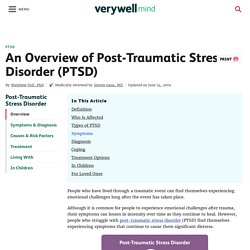
Although it is common for people to experience emotional challenges after trauma, their symptoms can lessen in intensity over time as they continue to heal. However, people who struggle with post-traumatic stress disorder (PTSD) find themselves experiencing symptoms that continue to cause them significant distress. Definition The current Diagnostic and Statistical Manual of Mental Disorders, the DSM-5, is a manual that clinical professionals use to diagnose mental health conditions. In previous years, PTSD fell under the category of anxiety-related conditions.
Who Is Affected It is estimated that there are currently around 8 million people in the United States who are living with PTSD.2 These numbers vary depending on things like gender, emotional response to trauma, and other factors. Types of PTSD Dissociative6 Delayed onset/expression Preschool. (7) POST TRAUMATIC STRESS DISORDER (PTSD), Causes, Signs and Symptoms, Diagnosis and Treatment.
How PTSD and Trauma Affect Your Brain Functioning. Source: Geralt/Pixabay About 10 percent of women and 4 percent of men will develop Post-Traumatic Stress Disorder (PTSD) over their lifetimes.
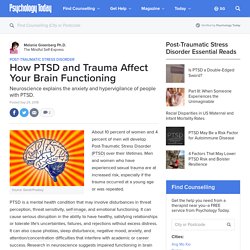
Men and women who have experienced sexual trauma are at increased risk, especially if the trauma occurred at a young age or was repeated. PTSD is a mental health condition that may involve disturbances in threat perception, threat sensitivity, self-image, and emotional functioning. It can cause serious disruption in the ability to have healthy, satisfying relationships or tolerate life’s uncertainties, failures, and rejections without excess distress. It can also cause phobias, sleep disturbance, negative mood, anxiety, and attention/concentration difficulties that interfere with academic or career success.
Article continues after advertisement What Is PTSD? PTSD is a mental health condition that can develop in response to a trauma that may have occurred recently or in the distant past. What Brain Areas are Implicated in PTSD? The Amygdala Summary. (7) The 5 Types of PTSD (Post Traumatic Stress Disorder) Types of PTSD. There are five main types of post-traumatic stress disorder: normal stress response, acute stress disorder, uncomplicated PTSD, comorbid PTSD and complex PTSD.
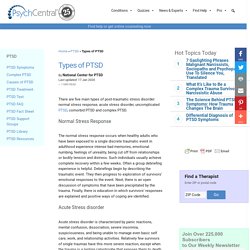
The normal stress response occurs when healthy adults who have been exposed to a single discrete traumatic event in adulthood experience intense bad memories, emotional numbing, feelings of unreality, being cut off from relationships or bodily tension and distress. Such individuals usually achieve complete recovery within a few weeks. Often a group debriefing experience is helpful. Debriefings begin by describing the traumatic event. They then progress to exploration of survivors’ emotional responses to the event. What Are PTSD Triggers? When you have posttraumatic stress disorder (PTSD), your symptoms can come and go.
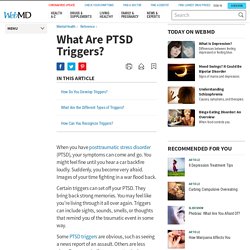
You might feel fine until you hear a car backfire loudly. Suddenly, you become very afraid. Images of your time fighting in a war flood back. Certain triggers can set off your PTSD. They bring back strong memories. Some PTSD triggers are obvious, such as seeing a news report of an assault. How Do You Develop Triggers? Recognizing and Coping With PTSD Triggers. Traumatic or stressful events are an unfortunate and common part of life.
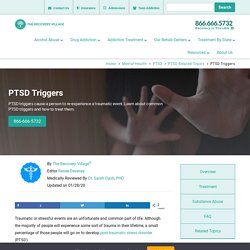
Although the majority of people will experience some sort of trauma in their lifetime, a small percentage of those people will go on to develop post-traumatic stress disorder (PTSD). PTSD is a psychiatric condition that develops in some people following a traumatic or stressful experience, such as violence or loss of a loved one. How to Develop a Safety Plan for PTSD Symptoms. If you have post-traumatic stress disorder (PTSD), then you likely know that your PTSD symptoms can occur at any time and in any place.
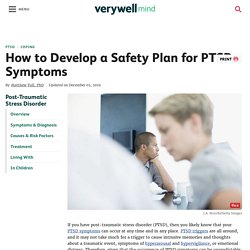
PTSD triggers are all around, and it may not take much for a trigger to cause intrusive memories and thoughts about a traumatic event, symptoms of hyperarousal and hypervigilance, or emotional distress. Therefore, given that the occurrence of PTSD symptoms can be unpredictable, it is important to create a safety plan for coping with them when they occur. What Is a Safety Plan? As the name implies, a safety plan is designed to keep you safe when you are suddenly confronted with a difficult situation or crisis. It is basically a way of planning ahead for how to cope with problems should they arise.
Below are some ideas of things to consider including in your personalized safety plan for dealing with your PTSD symptoms when they occur. Think Ahead. PTSD: Coping, Support, and Living Well. (7) 4-7-8 Breathing Exercise to alleviate Anxiety and Stress for Teens and Adults. (7) Five Minute Mindful Breathing. (7) How to practice mindfulness. (7) How To Practice Mindfulness - 4 Easy Ways To Meditate During Day To Day Life. How to Reduce Anxiety With Progressive Muscle Relaxation. Progressive muscle relaxation (PMR) is a stress and anxiety management technique.
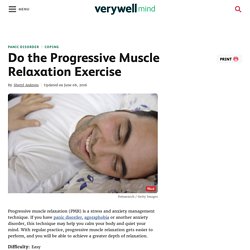
If you have panic disorder, agoraphobia or another anxiety disorder, this technique may help you calm your body and quiet your mind. With regular practice, progressive muscle relaxation gets easier to perform, and you will be able to achieve a greater depth of relaxation. Time Required: 10–15 minutes Make sure you are comfortable. You may be sitting in a chair or lying down. By practicing this exercise regularly, you will be able to recognize tightness in various muscle groups and relax them on cue. You can add muscle groups to the exercise, or you can just focus on your individual areas of tension.After tightening muscle groups, make sure to release the tension quickly, not gradually. The Benefits of PTSD Group Therapy. When it comes to seeking out treatment for PTSD (or any other psychological difficulty), you may wonder if it would be helpful to attend group therapy.
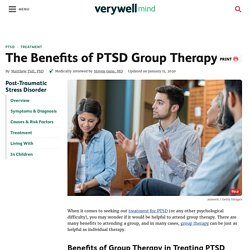
There are many benefits to attending a group, and in many cases, group therapy can be just as helpful as individual therapy. Benefits of Group Therapy in Treating PTSD Some of the advantages of group therapy for people with PTSD are listed below. Validation A major benefit of group therapy is validation. Calm - The #1 App for Meditation and Sleep. Home - Calm Harm App. Samaritans of Singapore (SOS) Sexual Assault Care Centre (SACC) No walk-ins!

Please call 6779-0282 for an appointment. While Singapore remains at Dorscon Yellow or higher, we are unable to entertain ANY walk-ins. Thanks for your understanding. Rape and sexual assault can be highly traumatic for victims. It can take a long time to get over the trauma of such a crime. The Sexual Assault Care Centre (SACC) at AWARE provides survivors with crucial services to help them deal with their trauma and make decisions about their next steps. Healing will take time and courage, but you do not have to go through this experience alone. All calls and cases are kept strictly confidential. SACC provides the following specialised services to support victims and survivors of sexual assault. Click on these links for more information on rape and sexual assault: Safe Space - Singapore's first online to offline counselling app.
(7) Surviving Sexual Abuse. (7) How To Heal From Trauma.